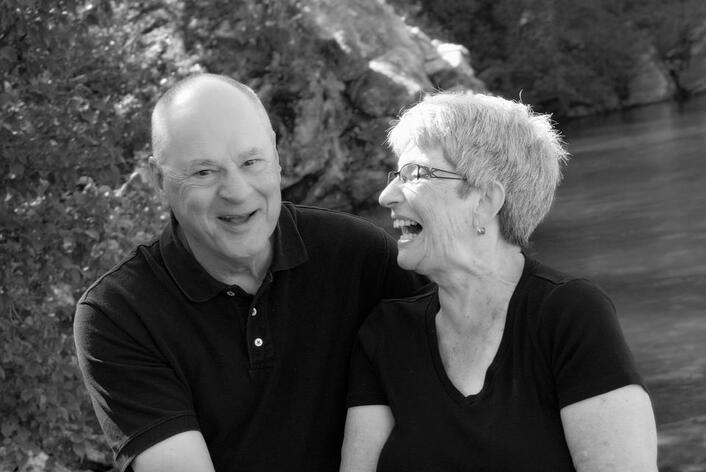|
I have had many roles in my life: mother, wife, sister, friend, writer, teacher, musician, but my role as John Riseland's daughter has always been one of my favorites.
Yesterday I gathered with people who I have known all my life, and we said good-bye to my dad. His service was packed - standing room only - a fitting and appropriate send-off for a humble and kind man who touched more lives than he ever would have known. My dad was a giant of a man; he was 6'4" and over 200 pounds with size 14 feet. People with that stature can be scary to some, but I don't think my dad ever was. Sure when he coached high school basketball he could bark at a ref, or if someone threatened his family in any way or questioned his integrity, he got mad like anyone else. But in his day to day life, in his general demeanor, he was a gentle and kind soul. He always had a smile and a laugh. He loved telling jokes, and he never met bad dad pun he didn't love. Here's an example of his bad dad jokes: when we were kids, every time we ate Chinese food and it came time for fortune cookies, he would open his, adopt a shocked look, and pretend to read from the fortune in a panicked sounding voice, "Help! I'm being held prisoner in a Chinese fortune cookie factory." After the first dozen or so times, we groaned when he said it, but he never stopped believing it was the height of hilarity. My dad was always uniquely himself. I never saw him be anything but exactly who he was. He was a man without pretension, and if he thought it, he probably said it. He loved to tease and joke. He thought deeply about everything in life, and he loved to engage in thoughtful, philosophical discussions. In many ways, he was a paradox. He was a deeply spiritual man with a vastly open mind. He was a talented athlete who could also be clumsy and accident prone. This is a man who played college basketball with grace and yet still somehow managed to run over his foot with a lawn mower or drop a fully cooked Thanksgiving turkey in the garage behind the car. Because of these things, we affectionately call him Clark Griswold and joked that his klutz DNA runs generations deep. We're not wrong. My mom and dad raised three very different daughters - all independent women with vastly different careers and belief systems, and he's always respected each of us and our right to believe what we do and find our own understandings for the way the universe works. He was a good parent - probably even an excellent one. In fact, he and my mom used to teach parenting classes in their church to young couples. Yet with all his knowledge of parenthood, he seldom tried to tell my sisters and me how to raise our kids and if he did, he realized afterward that was what he was doing and apologized. For instance, one night in a casual dining restaurant when my son was about six, Tanner was playing with his glass of water by trying to spoon the ice out of the glass. "I wouldn't let you girls do that," my dad said, to which I responded, "Dad, sometimes you just have to pick your battles." I promptly forgot our conversation, but dad must've been thinking about it throughout dinner and on the way home. When we got home, he said, "You know Kar - you're right, and I'm sorry. Sometimes I forget what a challenge it can be to raise young kids. You do have to pick your battles." That was what he did. If he felt he overstepped, if he felt he stepped outside of his integrity, he apologized. And he probably apologized a lot. My dad was, after all, human. There were things that stood out about my dad to virtually everyone: his humor, his intelligence, his integrity, his big heart, his kindness, compassion, and dedication to community service, and his devotion to his family. He set a tremendous example for his children and grandchildren. He did what he thought was right, he told the truth (except when he was teasing the kids - then he virtually never told the truth), and he cared deeply for others. He was a friendly guy who always greeted people warmly and made them feel welcome. In his career, he was a high school guidance counselor and in his private time, he spent countless hours in community service, feeding the homeless and working with the underserved and disenfranchised. He and my mom served sandwiches to the homeless in downtown Bellingham, created and served a community meal for people who just needed some hot food, and engaged in a number of similar activities. Dad treated everyone with dignity and respect. I remember a walk through Bellingham with my parents and son one afternoon, and we came across a man who appeared to be homeless carving a piece of wood on the steps of an old building. As we stopped to look at the building, my parents engaged him in conversation, asking what he was carving, what it meant, and how he'd learned to carve. They asked what he did with his carvings. They treated him like they would anyone else they encountered; there wasn't a hint of condescension or judgment from either of them. They didn't ignore him or walk away. They engaged him. Because he was a human, and they knew and recognized that. My mom and dad were married for 55 years, and they were devoted to each other. Although we moved away from our hometown, my sisters and I seldom worried about them because they had each other. The shared faith, intellectual and spiritual curiosity, the love of laughter, a love of sports, a dedication to community service, and a deep and abiding love for one another. My dad loved and cared for my mom in small and big ways that were beautiful to witness. I can't imagine her without him, and I couldn't imagine him without her. There is so much more I could say about my dad because he had a life well-lived. He crafted a full life in which he engaged in all of the things that were important to him. He never let grass grow under his feet; he was a man always on the go overflowing with good will and laughter. Last night as we were driving home from the memorial, Jim said, "The world is a crappier place without him," but I disagree. The world is a better place for his having been in it, and his legacy will live on in all of the lives he touched. He was a man who did what he believed was right, and he taught his children and grandchildren to do the same. And through that, who he was is not lost to the world; it is multiplied. His legacy of love and giving lives on in all of the lives he touched, and the world is an infinitely better place for his having been here.
0 Comments
Leave a Reply. |
Categories
All
Archives
December 2022
|
AUTHOR KAREN FRAZIER
- Home
-
Books
- Angel Numbers for Beginners
- Avalanche of Spirits
- Chakra Crystals
- Complete Reiki
- Crystal Alchemist
- Crystals for Beginners
- Crystals for Healing
- Dancing with the Afterlife
- Dream Interpretation Handbook
- Essential Crystal Meditation
- Higher Vibes Toolbox
- Introduction to Crystal Grids
- Little Book of Energy Healing Techniques
- Noisy Ghosts
- Reiki Healing for Beginners
- Transform Your Life with Alchemy
- Ultimate Guide to Psychic Ability
- Usui Ryoho Reiki Manual
- Cookbooks
- Other Books
- Classes
- Connect
- Meditate

 RSS Feed
RSS Feed
